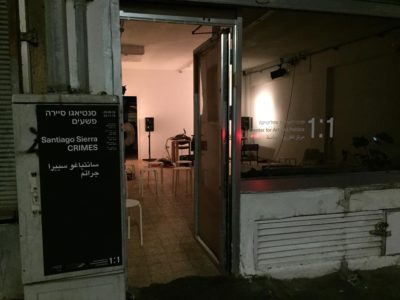
26 Sep Santiago Sierra’s new work in Tel Aviv is every bit as provocative as you’d expect
Santiago Sierra is about to unveil a new work in Tel Aviv and it is every bit as provocative as you would expect from the Spanish artist, whose career has been marked by controversy at every turn (more of that later, though). 697 State Crimes opens today at the 1:1 Centre for Art and Politics and features actors reading out the 697 names of those killed in the Israeli-Palestinian conflict since the end of the 2014 Gaza War, up until the end of last month.
But before viewers see 697 State Crimes, there will also be a screening of Sierra’s 2014 work 2205 State Crimes, which was first performed in Madrid. This is identical in nature, but in 2205 State Crimes, actors read out the 2,205 names of those killed during the 2014 Gaza War. According to the United Nations Office for the Co-ordination of Humanitarian Affairs, 71 of the casualties were Israeli. The performance of 697 State Crimes will be recorded, and both films will be screened at the gallery for two months.
By showing these works one after the other, Sierra, 52, is underlining how little progress has been made in the region since 2014, a point made clear by the recent protests along the Gaza border, in which 168 Palestinians were killed. “The objective is to remember and pay tribute to those killed by military violence,” Sierra says. “This is, as with my other works, a markedly anti-militarist work.”
That may be so, but performing this work at a gallery in Israel nevertheless feels like an inflammatory statement – the overwhelming majority of the names read out will be those of Palestinians killed by Israeli forces. Sierra disagrees, though. “I can’t understand how a performance of a pacifist nature can provoke any complaints,” he says. “Nor can I understand how military action can generate so much applause.”
The concept of these “list” works – Sierra has also presented a performance called The Names of Those Killed in the Syrian Conflict Between 15th of March 2011 and 31st of December 2016 – might seem simplistic to the point of absurdity. But if you watch a video of 2205 State Crimes, its power immediately strikes you. Sierra’s works are like living memorials.

As the names are read out in an even tone – Nidal Ali Daka; Nidal Jamaa Abu Asy; Fatima Ahmad Al-Arja – everything else seems to quieten, the thoughts in your head stop buzzing and the futility of war is illustrated in the most devastating fashion. The names hang in the air like ghosts, like echoes of lives snatched away.
“The list of people is a representation of the social order,” Sierra says. “The world is known by the different lists or sets that determine people.”
Sierra has a long history of making bold statements that force us to confront the things – and the people – we too often shy away from. In 2002, he presented a work called Group of People Facing a Wall, in which he paid homeless men and women to stand facing a wall for an hour at a time. The sense that these people are somehow being punished is unmistakable. And by only showing us the backs of their heads, Sierra offers a stinging criticism of the way in which we push the most vulnerable in our society to the margins.
Similarly, for 160cm Line Tattooed on 4 People (2000), Sierra paid four heroin addicts to have a line tattooed across their backs. This turns exploitation into entertainment and, according to London’s Tate Modern, which exhibited this particular piece, emphasises “the tension between the choice of the participants to undertake the tasks for a wage, and their lack of choice owing to their economic situation and neglected medical conditions”.
You may not feel comfortable watching Sierra’s performances – but that is exactly the point. Our discomfort stems from an understanding that we are all, at some level, a part of the problems that currently afflict our society.
I wonder, though, if Sierra believes that art can really make a difference. Sure, we feel shaken by his images, but then we go back to our houses – and the homeless actors return to the streets. Likewise, we will watch and listen as 697 State Crimes is read out, but the Israeli-Palestinian conflict continues regardless.
Sierra understands this and admits that his work won’t have any impact on the situation in the Middle East. “The only really effective thing would be the abolition of the production and manufacture of weapons and the dissolution of the armies,” he says. “Because I don’t think that can happen, I don’t see any possible change. It looks like a war designed not to be won or lost, but to last.”
But the knowledge of this, in many ways, makes 2205 State Crimes and 697 State Crimes even more poignant. That Sierra feels the need to keep making these works – and that a single death renders the list inaccurate and out of date – is perhaps the most damning statement of all.
